De Engelse schrijver William Somerset Maugham werd geboren in Parijs op 25 januari 1874. Zie ook alle tags voor William Somerset Maugham op dit blog.
Uit: A Writer’s Notebook (1894)
“There are two kinds of friendship. The first is a friendship of animal attraction; you like your friend not for any particular qualities or gifts, but simply because you are drawn to him. C’est mon ami parce que je l’aime parce que c’est mon ami’. It is unreasoning and unreasonable; and by the irony of things it is probable that you will have this feeling for someone quite unworthy of it. This kind of friendship, though sex has no active part in it, is really akin to love: it arises in the same way, and it is not improbable that it declines in the same way.
The second kind of friendship is intellectual. You are attracted by the gifts of your new acquaintance. His ideas are unfamiliar; he has seen sides of life of which you are ignorant; his experience is impressive. But every well has a bottom and finally your friend will come to the end of what he has to tell you: this is the moment decisive for the continuation of your friendship. If he has nothing more in him than his experience and his reading have taught him, he can no longer interest or amuse you. The well is empty, and when you let the bucket down, nothing comes up. This explains why one so quickly makes warm friendships with new acquaintances and as quickly breaks them: also the dislike one feels for these persons afterwards, for the disappointment one experiences on discovering that one’s admiration was misplaced turns into contempt and aversion. Sometimes, for one reason or another, however, you continue to frequent these people. The way to profit by their society then is to make them yield you the advantages of new friends; by seeing them only at sufficiently long intervals to allow them to acquire fresh experiences and new thoughts. Gradually, the disappointment you experienced at the discovery of their shallowness will wear off, habit brings with it an indulgence for their defects and you may keep up a pleasant friendship with them for many years. But if, having got to the end of your friend’s acquired knowledge, you find that he has something more, character, sensibility and a restless mind, then your friendship will grow stronger, and you will have a relationship as delightful in its way as the other friendship of physical attraction.”
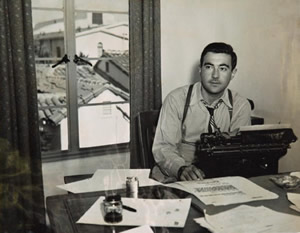
William Somerset Maugham (25 januari 1874 – 16 december 1965)
De Engelse schrijfster Virginia Woolf werd geboren op 25 januari 1882 te Londen. Zie ook alle tags voor Virginia Woolf op dit blog.
Uit: To the Lighthouse
“But,” said his father, stopping in front of the drawing-room window, “it won’t be fine.”
Had there been an axe handy, or a poker, any weapon that would have gashed a hole in his father’s breast and killed him, there and then, James would have seized it. Such were the extremes of emotion that Mr. Ramsay excited in his children’s breasts by his mere presence; standing, as now, lean as a knife, narrow as the blade of one, grinning sarcastically, not only with the pleasure of disillusioning his son and casting ridicule upon his wife, who was ten thousand times better in every way than he was (James thought), but also with some secret conceit at his own accuracy of judgement. What he said was true. It was always true. He was incapable of untruth; never tampered with a fact; never altered a disagreeable word to suit the pleasure or convenience of any mortal being, least of all of his own children, who, sprung from his loins, should be aware from childhood that life is difficult; facts uncompromising; and the passage to that fabled land where our brightest hopes are extinguished, our frail barks founder in darkness (here Mr. Ramsay would straighten his back and narrow his little blue eyes upon the horizon), one that needs, above all, courage, truth, and the power to endure.
“But it may be fine-I expect it will be fine,” said Mrs. Ramsay, making some little twist of the reddish-brown stocking she was knitting, impatiently. If she finished it tonight, if they did go to the Lighthouse after all, it was to be given to the Lighthouse keeper for his little boy, who was threatened with a tuberculous hip; together with a pile of old magazines, and some tobacco, indeed, whatever she could find lying about, not really wanted, but only littering the room, to give those poor fellows, who must be bored to death sitting all day with nothing to do but polish the lamp and trim the wick and rake about on their scrap of garden, something to amuse them. For how would you like to be shut up for a whole month at a time, and possibly more in stormy weather, upon a rock the size of a tennis lawn? she would ask; and to have no letters or newspapers, and to see nobody; if you were married, not to see your wife, not to know how your children were,-if they were ill, if they had fallen down and broken their legs or arms; to see the same dreary waves breaking week after week, and then a dreadful storm coming, and the windows covered with spray, and birds dashed against the lamp, and the whole place rocking, and not be able to put your nose out of doors for fear of being swept into the sea? How would you like that? she asked, addressing herself particularly to her daughters. So she added, rather differently, one must take them whatever comforts one can.”
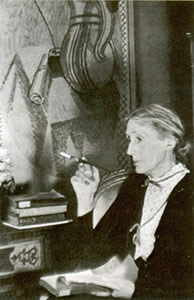
Virginia Woolf (25 januari 1882 – 28 maart 1941)
Foto door Gisèle Freund, 1939
De Nederlandse schrijfster Renate Dorrestein werd geboren in Amsterdam op 25 januari 1954.Zie ook alle tags voor Renate Dorrestein op dit blog.
Uit: Verborgen gebreken
“Schuimige witte wolkjes drijven langs de strakblauwe hemel, nevel dampt rond de bergtoppen en de zee glinstert alsof zij elk moment juwelen zal prijsgeven die ze ooit heeft buitgemaakt. Een ochtend die ‘Ah!’ doet zeggen, als een teug champagne. Een ochtend als een klaroenstoot.
Agnes knippert met haar ogen tegen het licht terwijl ze de dekens van zich af slaat en met stramme benen uit bed stapt. Ze zal eindelijk een zomers bloesje kunnen aantrekken en met haar oude blote voeten in een paar sandalen kunnen stappen. Eerst vlug boterhammen smeren, en dan meteen de zon in.
Maar als ze beneden komt blijkt Bazooka, die in werkelijkheid Christine Jansen heet, in de keuken bezig de tafel te dekken. Messen, vorken, theelepeltjes, zelfs roodgeblokte servetjes: aan alles is gedacht. ‘Wil je koffie of thee?’ vraagt ze gedienstig aan Agnes, onderwijl een mandje met brood op tafel zettend. Het water kookt al. Op het zonbeschenen aanrecht staan de thee- en de koffiepot klaar.
‘Nee maar. Thee, graag,’ zegt Agnes. Het is altijd haar uitgangspunt geweest dat kinderen niet tot huishoudelijke karweitjes moeten worden aangespoord. Ze kunnen later nog genoeg tafels dekken en vaat doen.
Op haar tenen bij het aanrecht staand, schenkt Christine het theewater op. Ze draagt een schoon, lichtblauw trainingspak dat ze in een van de kasten moet hebben gevonden. Ze heeft haar haren gewassen en die nat en wel in een keurige paardestaart gebonden. Haar wangen glimmen alsof ze langdurig zijn geboend. ‘Zal ik brood in de rooster doen?’ Je hoeft heus niet ineens een modelkind te zijn, denkt Agnes, plotseling neerslachtig. Ik stuur je echt niet weg. Ze zegt: ‘Ja, lekker.’ Ze gaat zitten.”
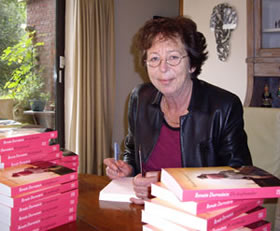
Renate Dorrestein (Amsterdam, 25 januari 1954)
De Amerikaanse schrijver en regisseur Stephen Chbosky werd geboren op 25 januari 1970 in Pittsburgh, Pennsylvania. Zie ook alle tags voor Stephen Chbosky op dit blog.
Uit: Pieces
“I had been writing for a long time. I had made a movie. I had worked for Hollywood studios. But this was different. This was my book and my main character, Charlie, who meant the world to me. This was a singular wish. And someone out there had said yes.
I finished my work that afternoon. I put a rib dinner on American Express that night. And everything was right in the world. Ten months later, after another dinner, I went with my sister Stacy into a bookstore, and for the first time, I saw my book on the shelves. That green cover and picture of the boy’s legs, my name, and the title. All I could say was, “There it is.” I didn’t know what would happen to it. I didn’t know if anybody would read it. All I knew was that it was out there, and as long as it was out there, there was a possibility.
So, when Greer Kessel Hendricks, who is my editor and dear friend, asked me to write an introduction to this collection, all I could think about were the fifteen young authors whose stories appear in this book walking into their local bookstores with their friends and families and saying: “There it is.”
Then, I thought about the possibility for them. And for you. And I congratulate all persons involved. Because whether you picked up this book because you love short stories, are interested in young authors, thought the cover looked good, or want to hate it, you have it. It’s in your hands right now. And there is a possibility that somewhere in these pages, you may discover something special. Something honest. Well-crafted. Messy.”
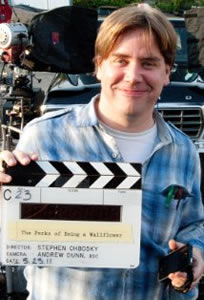
Stephen Chbosky (Pittsburgh, 25 januari 1970)
De Israëlische schrijver David Grossman werd geboren op 25 januari 1954 in Jeruzalem. Zie ook alle tags voor David Grossman op dit blog.
Uit: Writing in the Dark
“When I was eight years old, my father suggested that I read Sholem Aleichem’s Adventures of Mottel, the Cantor’s Son. Father himself had been a child in the Galician shtetl of Dynow, just a few miles from Lemberg, otherwise known as Lvov. Like Mottel, he had lost his father at a young age and lived with his brothers and sisters and hardworking widowed mother.
Father, who immigrated to Palestine in 1936, did not talk much about his childhood. Only rarely was the curtain drawn to reveal a strange, enchanting, intangible world, almost like a shadow theater. Then I could see my father as a little boy, sitting in the cheder opposite a stern teacher who used to fix broken china during class, binding the pieces together with wire. I could see Father at the age of four, walking home from the cheder in the dark, lighting his way with a candle stuck inside half a radish—nature’s candlestick. I could see the doctor bringing a precious remedy for my grandfather’s ailment as he lay on his deathbed: a paper-thin slice of watermelon. And I could see my father looking out the window.
Father handed me Adventures of Mottel, the Cantor’s Son (in Y. D. Berkowitz’s Hebrew translation), and I read the title of the first chapter while he held the book in his hands—”Today’s a Holiday—Weeping Is Forbidden! “— and then the following words: “I bet no one was so delighted with the warm sunny days following Passover as I, Mottel, the son of Peissi the Cantor, and as the neighbor’s calf, ‘Menie’ (as I, Mottel, have named him).”
I did not understand a word of what I read, and yet there was something there. I took the book from my father’s hands and climbed up onto the windowsill, my favorite reading place. Outside was Beit Mazmil, where the residents were trying to accustom themselves to the neighborhood’s newly ordained Hebrew name, Kiryat Yovel. It was a cluster of apartment buildings whose occupants had made their way from seventy exiles and who argued in seventy languages. The dwellers of the tinshack neighborhood, whom we called asbestonim, looked on enviously at those who were lucky enough to get a tiny apartment in one of the buildings. There were young couples who confronted life with determined optimism, and Holocaust survivors who walked the streets like shadows and whom we children feared. “
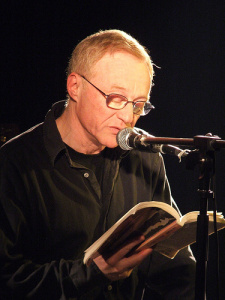
David Grossman (Jeruzalem, 25 januari 1954)
Zie voor nog meer schrijvers van de 25e januari ook mijn blog van 25 januari 2012 deel 1 en eveneens deel 2 en ook deel 3.
